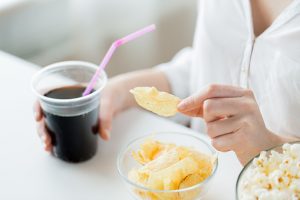 If you don’t drink alcohol then you may think that your liver is not in danger. Unfortunately, you’d be very wrong. This is because the type of liver disease that is growing in prevalence has nothing to do with alcohol. In fact, it has to do with fat.
If you don’t drink alcohol then you may think that your liver is not in danger. Unfortunately, you’d be very wrong. This is because the type of liver disease that is growing in prevalence has nothing to do with alcohol. In fact, it has to do with fat.
Non-alcoholic fatty liver disease (NAFLD) rates are growing by the day, largely due to the growing number of obese individuals. Obesity is the number one risk factor for NAFLD, and an estimated 75 percent of obese people are at risk for developing NAFLD.
Advertisement
Other risk factors for NAFLD include diabetes, high cholesterol, and high blood fats, although no clear cause is ever found in some cases. (Miracle fruit lowers cholesterol in 30 days.)
NAFLD is a result of fat accumulation in the liver. As it gets more and more burdened with fat, the liver becomes unable to perform its many functions to the best of its ability.
You may not realize it but your liver is responsible for over 500 functions that are essential for smooth operation of the entire body. A sick liver translates to an overall sickness. The problem arises when symptoms of a sick liver are misdiagnosed with other conditions which delays treatment.
Aside from the aforementioned risk factors for NAFLD, one main contributor to the condition is diet. A high-fat diet is well known to be promoting obesity, diabetes, and high cholesterol – as well as non-alcoholic fatty liver disease. (This “Mother of all Superfoods” fights off a slew of free radicals.)
Diet plays large role in NAFLD
When we consume too much fat that is not used up completely, it will end up in the liver. Over time, this accumulation of fat leads to disease of the liver. One compound which is a major player in the development of NAFLD is fructose. Studies have shown that not only does fructose contribute to fat production in the liver but also to a metabolic environment that is favorable for the development of NAFLD.
Fructose is a simple sugar found in fruits, some vegetables, honey, agave, and table sugar. High-fructose corn syrup is also dangerous for your liver. It is often found in carbonated beverages, sweetened fruit drinks, cereals, baked goods, and condiments.
Eating to prevent NAFLD
Your best bet to prevent non-alcoholic fatty liver disease is to modify your diet along with your lifestyle habits. For starters, it’s a good idea to restrict intake of refined grains such as white rice, white breads, and refined cereals. Opt for whole grains, brown rice, quinoa, and whole wheat pastas instead.
You will also want to cut back on your intake of sugar. Added sugars should be no more than five percent of your daily caloric intake. This translates to 24 grams or six teaspoons for women, and 36 grams or nine teaspoons for men.
When choosing the right fats to consume in your diet, opt for healthier varieties such as those found in fish, olive oil, and nuts.
Advertisement
You should also eat more foods high in antioxidants and, above all, avoid alcohol.
Along with your healthy eating plan, it’s important that you regularly exercise. Physical activity helps you maintain a healthy weight and manage other health conditions, including diabetes and cholesterol levels.
As you can see, the phrase “you are what you eat” truly applies, especially when discussing the health of your liver. So if you don’t want to be fat and sick, avoid foods high in fat which can make you sick.
